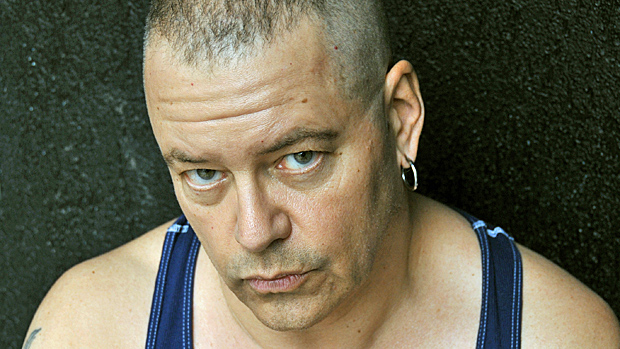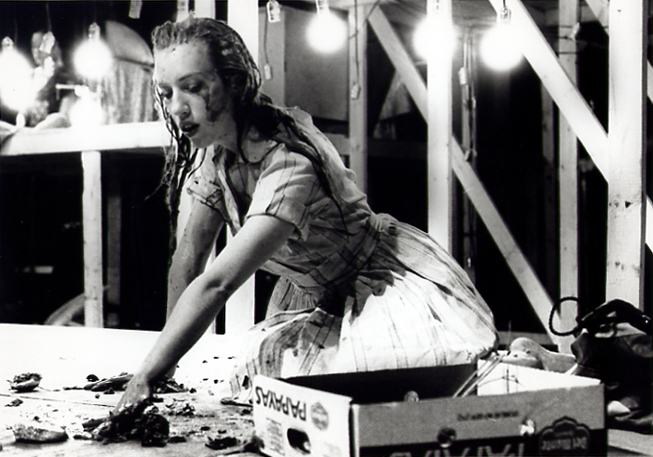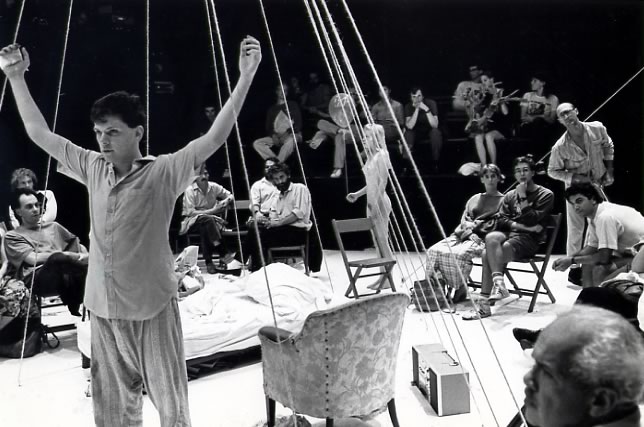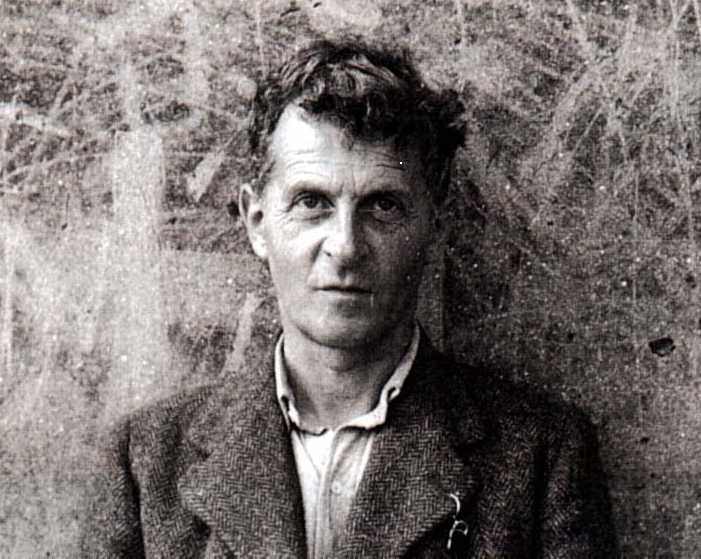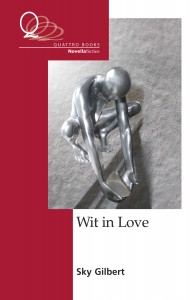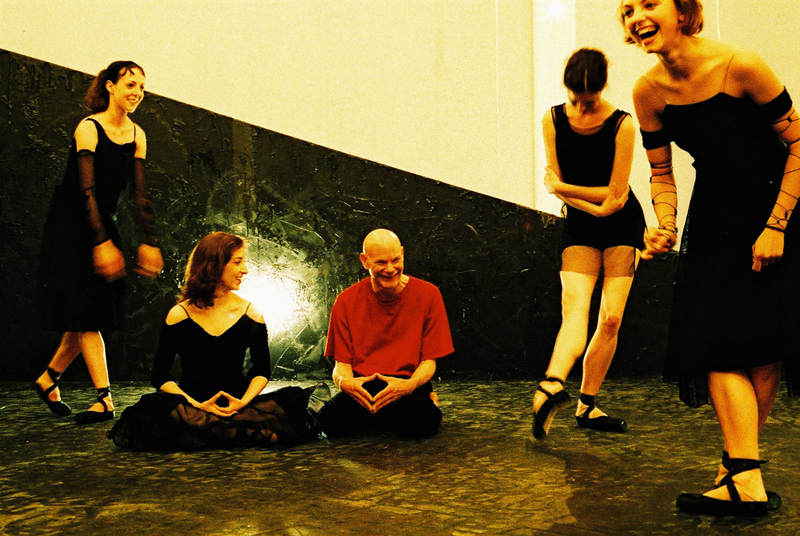Sky Gilbert: Criticism, Vomit, Sex and Greatness: an interview with Hillar Liitoja
Hillar: All right, what do you want to know?
Mike: Why don’t I give you the first half of a sentence, and you can fill in the rest? I’ve been thinking a lot about this upcoming interview on Sky Gilbert. And I’ve decided there’s one thing about Sky that I really can’t divulge, and that’s when…
Hillar: You’re working on a false premise because there is almost nothing that I can’t speak with him about. However you have hit upon a very interesting point because there is the almost. And the almost is… now maybe this isn’t finishing the sentence properly, but it’s a springboard to a completely different point. Sky is not good about taking criticism. In fact, I had the experience of Sky telling me exactly what to say if I didn’t like his last book. I wasn’t allowed to say, “Well Sky, the weakness of this book lies primarily with the main character who doesn’t really come across. I also found the London park sequence weak, it didn’t stimulate me.” You cannot say that to Sky. He told me, “So Hillar, if you didn’t like it, then what you say is, ‘You know Sky, this piece wasn’t really for me.’” And so I said to him, “You know Sky, this piece wasn’t really for me.” And then he said, “OK,” and we moved right on. It’s true. He will actually put The Words into your mouth. He will tell you The Right Thing To Say, so that his feelings are not hurt, and he’s not offended. It’s definitely about him not wanting to know the specific grounds of your discontent.
Mike: That makes me wonder about Sky playing Claudius in your 8-hour production of Hamlet. It was a large and difficult role, and one that likely generated some director’s notes.
Hillar: There was a ritual during the course of that never-ending performance whereby an entire roast chicken would be delivered, complete with potatoes and carrots. If I were playing that role, I would eat a leg of chicken, I might have a taste of the breast. Good. If I was feeling particularly hungry I would also have a wing. Sky would work through the entire chicken. He was still onstage, but he didn’t have another cue for 30 or 40 minutes. I remember looking on with amazement as he calmly chomped his way through that chicken at every performance.
I should make something clear. What I just said about his aversion to criticism does not apply to him as a performer. You’re totally OK to ask, “Could you say this louder or softer, or with more feeling, or move slower when you offer him the knife?” He’s great at following direction, that’s not criticism. What I’m talking about is a poem, play or novel that he wrote. We can sit here and argue that his acting is also a form of creating, but I think he draws a really clear line between being under the iron hand of the director…
Mike: That would be you.
Hillar: That would be me.
Mike: Mr. Iron Man.
Hillar: We’re talking basically when he’s written a play. I was going to say when he’s directed a play, but I can’t remember the last time he directed a play that wasn’t his own. You cannot criticize his direction or his text. In fact, I think I know why that is. It’s a tricky kind of thing. You don’t mind if I smoke?
Mike: No.
Hillar: If it gets unpleasant we’ll open the door, there’s several things we can do. You see, I think what happened with Sky is that early in his career, I guess in the early 80s, he was part of a thing at Tarragon. I don’t know what it was officially called, but it was like a writer’s workshop. There was a group of four or five writers, and the idea was that they would write, and then their work would be critiqued by the dramaturges at Tarragon. I’m pretty sure it was Tarragon. I don’t recall a specific Sky and Hillar conversation on this topic but I have heard it from others, and maybe Sky has actually spoken to me about this. What happened at Tarragon was that the dramaturges tried to shape his theatrical writing to fit into a norm, conforming to the currently “correct” style of writing. He actually submitted to that criticism, and then wound up not only disliking the final product but also feeling that his creative integrity had been violated. I think that he’s never really gotten over that. To this day he feels criticism as an attack on himself, an affront to his artistic essence. And if he does feel that way, I don’t blame him for repelling criticism of all sorts. Yet there are times when I wish he would not categorically repulse all suggestions. That he might view them as genuine attempts to bring greater clarity or focus to his own vision.
This is something I’ve also discussed with Gregory Nixon, who is the president of DNA Theatre, and a friend. Gregory takes a slightly different view on the matter. Gregory feels that Sky’s whole take is primary expression: I’m going to write what I feel right now and there is a truth, purity and validity in that. There is no point in going back to alter anything or… what is the expression? To polish.
Mike: First thought, best thought.
Hillar: According to Gregory, Sky would say: maybe this would be clearer if I would change a line or two. However that would be fighting the essence and truth of the original impulse. There is a perfection in the… I want to say vomit, and I don’t mean that at all in a bad sense. I just mean that when you vomit, it all comes out at once, and it’s perfect. It’s a perfect cleansing, it’s all there. No, I’m not going to go back and airbrush those phrases to make them more powerful, that would be destroying the integrity of the origin.
Mike: Your last play was based on Sky’s novel about Wittgenstein, Wit in Love. How did that come about?
Hillar: I was in Costa Rica when I received an email from Sky saying he’d written a new book that would be published soon. He’d loosely based one of the characters on me, and asked if I could read through it and make sure that he wasn’t overstepping any boundaries. I wrote him back and said: No, I’m not going to read it. You can write whatever you want, bring me a copy when it’s published. So he did, and I read it, and then months later he came over for dinner. I thought the evening was coming to its close when all of a sudden he brought up Wit in Love. What did I think of it? How did I feel about the portrayal of my character? Oh my god, I’d completely forgotten about that. It was nearly Christmas and I’d read it in August so it was not at all in the forefront of my mind. But it was very clear to me where he was completely stretching the truth, and where I could recognize myself. And then the miraculous thing happened. I went into the studio and got the novel, came back into the kitchen, opened it up to the chapter that dealt with me, and began reading out loud. Very soon Sky was laughing, and the more I read the more he laughed. I was laughing too, it seemed that nothing came out of my mouth without it sounding very funny. I had the thought that maybe it could be a performance, and Sky was enthusiastic and that’s really how it all got started. I only got two pages into the text, by that point I was a combination of drunk and stoned and my brain was just freewheeling. I was just so excited at the thought that there might be something there. Two weeks later I realized that not a single day had passed without me thinking about the potential of doing a performance/installation.
Mike: Can you say describe the novel?
Hillar: The book was fine, it’s not one of my favourites of his. It’s basically about Wittgenstein, though there’s a lot of Sky in Sky’s version of Wittgenstein. I don’t think it’s a coincidence that Sky is now a university professor and Wittgenstein was a professor of philosophy at Cambridge. And I don’t think it’s a coincidence that Wittgenstein was gay, as much as he denied it. He definitely had this homosexual impulse and of course that’s something that would deeply interest Sky. Particularly when it was not overt, where there is a struggle in a human being to accept his or her homosexuality. And on top of that, there’s also the struggle of coming out of the closet and how do I do that, and will I be rejected by everyone? Wittgenstein never admitted his gayness, God only knows if he ever did have sex with a guy.
Mike: Why would that be of particular interest to Sky?
Hillar: Number one, it’s just more interesting. It’s more complex than: I’m six years old and I know I’m gay. When I get into puberty all of my sexual fantasies are about boys. I want to touch them and I want them to touch me in the most special places and in the most special ways. It’s much more interesting to have that conflict because we’ve got to remember… what are we now, 2011? It’s only been in the last 40 years that homosexuality in most of the western world is not considered an aberration, a mental illness even. We’ve come so far in the past couple of decades that it’s often hard to remember that. The other point I would make is, hello? Sky had a girlfriend, at least one. So therefore he was living a heterosexual way of life. Obviously something happened to make him… transgress? (laughs) Would you throw in the mushrooms, and a little bit of oil and stir it?
Mike: Can you talk specifically about your chapter in the context of the book?
Hillar: In the context of the book which I read only once, a year and a half ago? When Wit is unsure of what his next move is, or when he’s facing the proverbial brick wall, the idea is to go to his brother and talk it out. The text describes it as psychic purging. As irritating as his brother might be, he is able to bring out of Wit some different way of seeing things, suggesting how he might extricate himself from a particular mess. And that’s exactly what happens. After seeing his brother, he goes back to his hotel and decides to return to Norway, alone. It’s time to extricate himself from the situation in Cambridge.
Mike: The chapter in the book is largely set in a kitchen that is modeled after your kitchen, and you reflected that by staging the play right here in your kitchen.
Hillar: How much more convenient could that be? The bulk of the chapter does take place in the kitchen and the bulk of…
Mike: …your life happens here.
Hillar: Yeah, a really big part does happen here. I was very fortunate that he cast it in my home, and in this kitchen.
Mike: Imagine this scene. There’s a shopper in a book store surrounded by a horizon of beautiful covers. Oh look at this handsome, it’s about Sky Gilbert. Never heard of him. Our shopper picks up the book and opens it somewhere in the middle. He doesn’t want to know anything about this guy, he wants to find a way to make new sentences. Go ahead librarian, make my day. So this Gilbert makes plays. I don’t care. Queer? I’m over that. Can you lay down a Sky moment that might speak to this feckless bookstore stranger?
Hillar: I’m not very good with moments. But I think we’ve already hit upon one thing that defines Sky’s essence. The sense of his artistic integrity. What else? Part of it has got to be sex. Do you know of a more sexual person than Sky? You could argue that all of us are sexually motivated to a certain degree. I find you really attractive or I do not find you attractive. I want to have sex with you. No, I don’t want to have sex with you. That’s still a sexual way of thinking. As opposed to: I’d like you to cut my hair because I love the way your wave curls. I think that’s a really important element of Sky, his sexual being, and the fact that he is so willing to talk about it. His willingness to try anything. OK. We’re lovers, we’ve been lovers for four months, and one day you come here and say, “Oh Hillar, I’ve just been thinking about pissing on you. I would love to get you dressed up as Peter Pan and pee all over you. And ideally you would also gasp so I could pee in your mouth.” Now, for a lot of people that would be disgusting and revolting.
Mike: The Peter Pan part you mean?
Hillar: I should have proposed Alice in Wonderland? Sky would say, “Sure, absolutely. We’ll try it.” I’m not at all suggesting that Sky would allow that again and again if he didn’t like it, or if there wasn’t any pleasure in it. Or if there wasn’t a balance of, “OK, I’m not really enjoying it, but he loves this, so I’ll continue doing it. It’s not like I hate it, I don’t really care for this, but you’re so turned on by it that of course I’ll do it again.” That’s how I see Sky, as totally willing. I’m using the word open to mean two different things. One kind of open is that we can talk about any aspect of my sex life, you can ask me anything about sex. But a completely different thing is that I’m open to every kind of sexual suggestion you might have. I’m totally willing to try it once, at the very least. There is no such thing as taboo for Sky. Though I’m not going to the extremes of OK, Sky, what would be really interesting is if I were to take my knife and cut off your cock, and then stick it in your bum. I don’t think that Sky would go that far. Because that’s mutilation, that’s castration, and that would destroy a big chunk of Sky’s sex life. I’m not talking about something as transgressive as that, but essentially, yeah, you’d like to pee on me while dragging me by the hair? Sure, let’s try it. In that sense, he is a totally extraordinary human being. I’m going to make another point about that. I have a feeling that his willingness to be so open about sexuality and sexual practices is a reflection of his openness in terms of theatre, in terms of art, in terms of accepting or giving a chance to anything that is wild, wacky, strange, unheard of. And I’m going to be really clear about this. It’s not that Sky is in favour of anything just because it’s way out there. It’s not that being crazy makes something good. The point is that there is a greatness in his humanity that allows him to be able to accept all kinds of possibilities, whether they are sexual or artistic. There is a greatness about Sky. Although it doesn’t extend to culinary matters.
Mike: Culinary matters?
Hillar: Yes, Sky’s taste in foods is very… parochial, not at all adventurous. I remember being at one of those post-opening receptions at Buddies where they recently adopted the formula of ordering a bunch of pizzas with different toppings. I was standing beside Sky, who was talking with someone, and saw him absentmindedly reach out and take a slice. I instantly grabbed his arm and said, “Don’t.” He looked at me bewildered. I said, “Anchovies,” and took the slice from his hand. Sky gave me this big smile and said, “Thank you. Thank you so much.” I beamed, I had made his night. I couldn’t help but feel that my saving him from the dreaded anchovies might have meant more to him than the success of his play.
Mike: The Iron Hand again.
Hillar: Yes.
Mike: But back to sex, do you feel like he pushed you sexually?
Hillar: As far as sexual transgression goes, I don’t need any pushing, OK? It’s not like accounts of his adventures made me think, oh yeah, that’s also possible. I think I have enough of a creative imagination myself, call it perversion if you want. So I don’t feel that Sky has influenced me in that sense. But, now here’s an interesting thing. Let me think about this for a moment. When I was in the early stages of doing my girl thing, my trans… what is it called? It’s not transgender. I guess it’s called transvestite, when you dress up as a girl. Sky was one of the first people I ever spoke to about it. He would never condemn anyone for any kind of consensual sexual practice, or any kind of sexual intuition, or sexual proclivity. You would only get encouragement from him. And I think this goes back to how difficult it was to be gay 40 years ago, and I’m sure for many people how difficult it is to be gay right now. Putting myself in the shoes of that 16-year-old boy who is wondering about being attracted to guys, it’s the loveliest thing to find someone who is supportive, and not condemning. How encouraging and interested he was when I talked to him about that. Sky didn’t precisely dress me up but said try this on, try that on.
Maybe criticizing a play of Sky’s is equal to criticizing his sexuality. That makes a lot of sense because of the way he defines himself. I think he would say, “I’m an artist” and then “I’m a sexual being,” more or less in the same breath. Those are the two most important things in his life. Why can’t they be linked? You attack one, you’re very possibly attacking the other. And you cannot attack my sexuality therefore you cannot attack my art. By the way, did you add oil when you put in the mushrooms? Could you? Because they love it, they soak it up. That’s perfect. And stir it. And if they’re getting mushy then just kill the heat. You know what? They’re going to be heated up again when we add the rice, so why don’t you just put the lid on and kill the heat? We’re going to eat well tonight.
